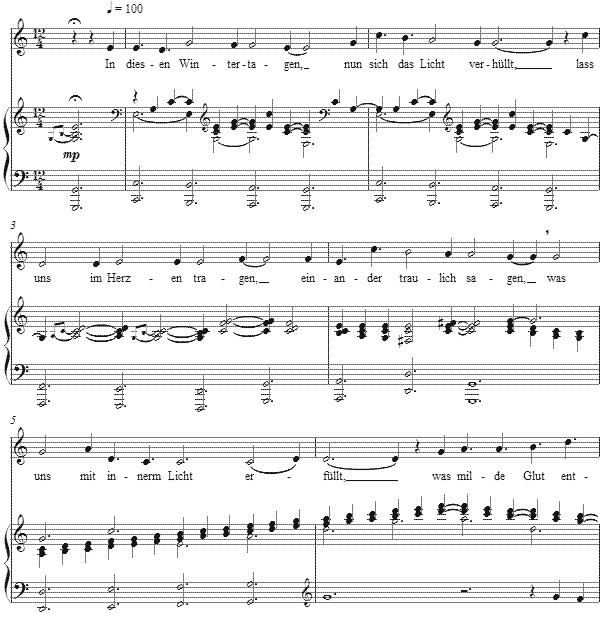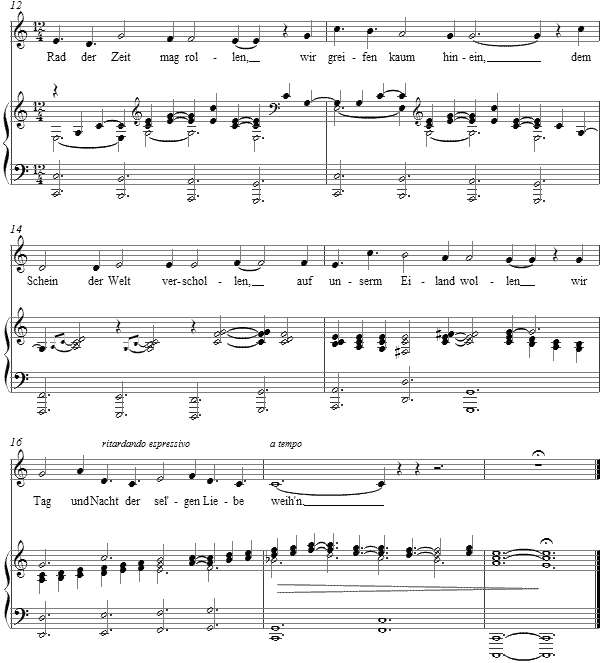Music and Texts of GARY BACHLUND
Vocal Music | Piano | Organ | Chamber Music | Orchestral | Articles and Commentary | Poems and Stories | Miscellany | FAQs
Winterweihe - (2009)
Karl Friedrich Henckellfor medium voice and piano
In diesen Wintertagen,
Nun sich das Licht verhüllt,
Laß uns im Herzen tragen,
Einander traulich sagen,
Was uns mit innerm Licht erfüllt.
Was milde Glut entzündet,
Soll brennen fort und fort,
Was Seelen zart verbündet,
Und Geisterbrücken gründet,
Sei unser leises Losungswort.
Das Rad der Zeit mag rollen,
Wir greifen kaum hinein,
Dem Schein der Welt verschollen,
Auf unserm Eiland wollen
Wir Tag und Nacht der sel'gen Liebe weih'n.[ 2 pages, circa 2' 15" ]
Karl Friedrich Henckell
In these winter days,
now the light disguises itself,
let us bear in our hearts
and say confidentially to one another
what fills ourselves with inner light.
That which inflames mild ardor,
should burn on and on;
that which tenderly binds souls
and builds ghostly bridges
should be our soft password.
The wheel of time may roll,
but we hardly grasp it,
forgotten in the glow of the world.
On our island we would
dedicate day and night to blissful Love.
Translation from German to English copyright © by Emily Ezust,
who created and maintains the The Lied and Art Song Texts Page, a marvelous resource.
Karl Friedrich Henckell (1864–1929), a German poet and author, was born in Hanover, and died in Switzerland's Lindau on Lake Constance. He studied philosophy, philology, and economics in Berlin, Heidelberg, Leipzig, Munich and Zurich. He was colleague to many other German language authors and co-editor of Modernen Dichtercharaktere (Modern Poets Characters, 1885). He lived for a time in Milan, then in Vienna, Brussels and from 1890 again in Zurich, moving to Berlin-Charlottenburg, then in 1908 to Munich, and finally to Müri near Berne in Switzerland. He saw himself as a revolutionary poet and champion of naturalism, declaring proletarian freedom and the destruction of the existing aristocratic society. This created popular success for him with the masses, but later in life he turned to simpler themes of nature and beauty.
The three stanza poem suggested the normal song form, such that the middle stanza moves on directly into the higher range of the piano accompaniment. The long-lined 12/4 time signature is meant to picture the long arch of each phrase in the tempo indicated, with the first long phrase rooted firmly and only in the tonic major.
Thus the repetition of the A section of the setting begins with the three stanza of the poem. The playoff in the accompaniment, as the tonic is reached extends with a short mention of the tonic seventh which is deceptive, as the subdominant is a simple cadence progression.
The score for Winterweihe is available as a free PDF download, though any major commercial performance or recording of the work is prohibited without prior arrangement with the composer. Click on the graphic below for this piano-vocal score.


